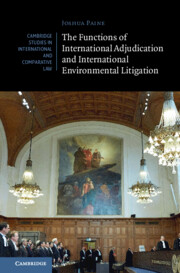Book contents
- The Functions of International Adjudication and International Environmental Litigation
- Cambridge Studies in International and Comparative Law: 189
- The Functions of International Adjudication and International Environmental Litigation
- Copyright page
- Dedication
- Reviews
- Contents
- Acknowledgements
- Table of Cases
- Abbreviations
- 1 Introduction
- 2 Adjudication in the World Trade Organization
- 3 Adjudication under the United Nations Convention on the Law of the Sea
- 4 International Court of Justice Litigation
- 5 Investment Treaty Arbitration
- 6 Conclusion
- Bibliography
- Index
- Cambridge Studies in International and Comparative Law
2 - Adjudication in the World Trade Organization
Published online by Cambridge University Press: 23 May 2024
- The Functions of International Adjudication and International Environmental Litigation
- Cambridge Studies in International and Comparative Law: 189
- The Functions of International Adjudication and International Environmental Litigation
- Copyright page
- Dedication
- Reviews
- Contents
- Acknowledgements
- Table of Cases
- Abbreviations
- 1 Introduction
- 2 Adjudication in the World Trade Organization
- 3 Adjudication under the United Nations Convention on the Law of the Sea
- 4 International Court of Justice Litigation
- 5 Investment Treaty Arbitration
- 6 Conclusion
- Bibliography
- Index
- Cambridge Studies in International and Comparative Law
Summary
Chapter 2 analyses the three selected challenges facing international tribunals – managing change, reviewing State conduct for compliance with international law, and dispute resolution – in World Trade Organization (WTO) adjudication, focusing on environmental disputes. WTO tribunals have often been faced with potential changes in international legal norms or changes in relevant facts. The chapter analyses the approach to the standard of review developed under the Agreement on the Application of Sanitary and Phytosanitary Measures. While this approach avoids WTO adjudicators determining questions of scientific correctness, it requires them to decide what counts as an adequate risk assessment process. The chapter then analyses the necessity tests developed by WTO adjudicators for scrutinising measures that pursue a permissible regulatory aim but also restrict a treaty-protected interest in trade liberalisation. Finally, the chapter interrogates an aspect of the WTO’s ‘chapeau jurisprudence’ that many commentators have read as a desirable example of international tribunals engaging in a procedural form of scrutiny and pushing regulating States to consider affected foreign interests.
Keywords
- Type
- Chapter
- Information
- The Functions of International Adjudication and International Environmental Litigation , pp. 38 - 95Publisher: Cambridge University PressPrint publication year: 2024

